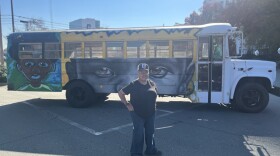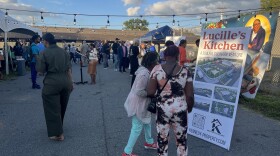OVERVIEW
Many of the neighborhoods surrounding the main thoroughfares into uptown Charlotte had historically been largely overlooked places where residents, many who are low income and belong to communities of color, watched the city’s boom from the sidelines. Now those communities are the centerpiece of Charlotte’s efforts to build a more equitable city.
Through the Corridors of Opportunity initiative, the city of Charlotte is investing in improving things like public safety, jobs and business opportunities, transportation, infrastructure and affordable housing in six areas: Graham Street/North Tryon Street, Sugar Creek Road/I-85, Albemarle Road/Central Avenue, Beatties Ford Road/Rozzelles Ferry Road, West Boulevard, and Freedom Drive/Wilkinson Boulevard.
MORE ARTICLES ON THE CORRIDORS OF OPPORTUNITY
Mike Collins is joined by City Council member Malcolm Graham and community leaders for a conversation about Charlotte’s six “Corridors of Opportunity” and the attempt to revitalize these historically neglected areas without displacing the people who live there.
-
A yellow school bus is probably a familiar sight on your morning commute. In Charlotte, a local artist has turned one bus into a mobile art studio and uses it to bring art to kids in the city’s mostly low-income communities. For 60-year-old Bunny Gregory, art was once a way to escape child abuse. Now, she aims to support other children and families in the same situation.
-
Charlotte Mayor Vi Lyles launched the Mayor's Racial Equity Initiative in 2021. It focused on reducing racial disparities in four areas.
-
A local artist is bringing creativity and mentorship to children in Charlotte’s low-income Corridors of Opportunity through a converted school bus. The "Underground Art Bus" is part of a project to ensure children have extracurricular activities, but the project faces challenges in continuing its journey on the roads without community support.
-
A historic club in Charlotte’s West End could reopen in the future after the Charlotte City Council’s Jobs and Economic Development Committee voted today to move forward with funding the building’s redevelopment.
-
Over 100 people gathered in Charlotte’s Beatties Ford Road corridor over the weekend for a fundraiser and to learn about a new venture that aims to foster culinary employment opportunities for residents.
-
More than 50 people gathered in Charlotte’s low-income Beatties Ford Road corridor ahead of the upcoming municipal election for a forum that aimed to highlight some of the top concerns and priorities amongst Black residents.
-
The Historic West End Partners has been pushing back on the narrative that the Beatties Ford corridor is unsafe. In part one of a two-part series, WFAE explored the group's new initiative that aim to increase foot traffic for small businesses amidst that narrative. In part two, WFAE continues to look at the Historic West End's efforts to revitalize the area, the challenges, and why many businesses continue to love it there.
-
The nonprofit Historic West End Partners has been a driving force trying to improve Charlotte’s mostly Black communities, such as Beatties Ford Road. In part one of a two-part series, WFAE explores the group's latest initiative that aims to help small businesses. And how business owners and residents are pushing back on long-standing narratives about safety in the corridor and why they love it here.
-
The Historic West End Partners, in partnership with Chase Bank, hosted a workshop Wednesday as part of an effort to boost foot traffic and help small Black and minority-owned businesses grow along the low-income Beatties Ford corridor.
-
Charlotte's West Boulevard Neighborhood Coalition’s effort to bring a grocery co-op to a community that’s been without a full-service grocery store for more than 30 years has yet to materialize, with the project short on funds.
-
A new commemorative marker was installed today in one of Charlotte’s Corridors of Opportunity. The marker aims to tell the history of places and people that helped shape the community.
-
A Charlotte workforce development group plans to open a digital tech repair space Thursday in one of the city’s low-income Corridors of Opportunity. It’s part of their efforts to help those who have been formerly incarcerated gain access to employment.
MORE NEWS ABOUT MAYOR'S RACIAL EQUITY INITIATIVE
-
The historically Black university is receiving $80 million in private money as part of the Mayor's Racial Equity Initiative. The goal is to vault the school to be one of the top ten HBCUs in the country and a recruiting ground for businesses.
-
The Mayor's Racial Equity initiative has reached its private sector fundraising goal of $150 million.
-
This month marks a year since the Mayor’s Racial Equity Initiative was announced. It’s a $250 million effort that Mayor Vi Lyles said would combine bold ideas, philanthropy and collaborative problem-solving to remove barriers to opportunity. So far, the initiative has raised nearly all of its goal.
-
Kim Henderson, the woman chosen to help oversee the Mayor's Racial Equity Initiative in Charlotte, is stepping down.
-
Kim Henderson was hired to lead a racial equity initiative in Charlotte. That was after a state audit found the Ohio Henderson led paid out $3.8 billion in fraudulent and inflated unemployment claims. The leader of the Charlotte Regional Business Alliance, which employs Henderson, says she knew about that before making a job offer.
-
The goal of Charlotte's newly announced Racial Equity Initiative is to raise $250 million that will go toward making North Carolina's largest city more diverse and addressing racial inequities.




















